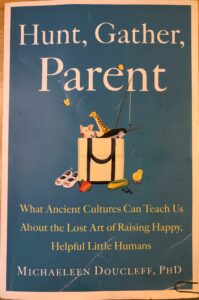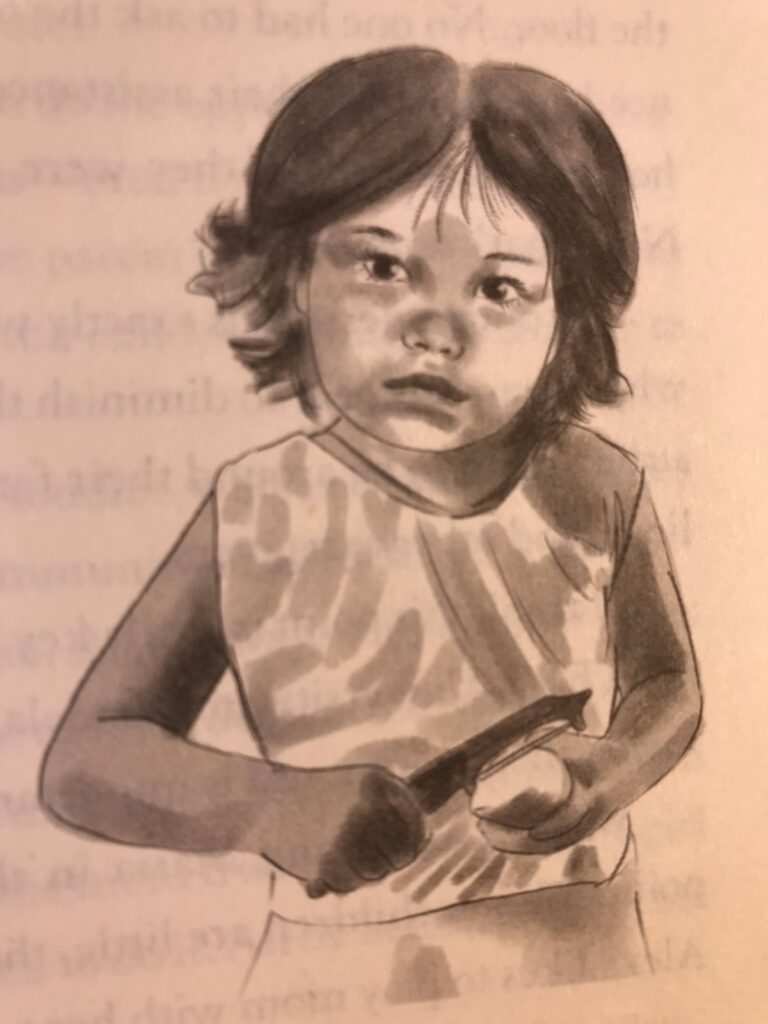To watch me tell (most of the) the information in this blog, click here: Video version
I have long been a fan of training children to do household work and take on responsibilities in the family. To feel good about themselves, children need to feel needed. And yet, so many parents overwork themselves doing things for children and for the family that the children could be taught to do themselves.

Learning from indiginous cultures
In her book, “Hunt Gather Parent – What Ancient Cultures Can Teach Us About the Lost Art of Raising Happy, Helpful Little Humans “, Michaeleen Doucleff writes about how parents in other cultures are very successful at training children to be contributing members of the household. This book fascinated me! It is easy and entertaining to read, and I highly recommend it for parents.
Doucleff says that in the last 200 or so years, our culture has moved away from the parenting methods that humans evolved over tens of thousands of years. She visited a Mayan community in Mexico, an Inuit community in Canada and a Hadzabe community in Tanzania and found remarkably similar parenting techniques. What struck her was how helpful the children and teenagers in these communities were! And when she asked these kids why they did so much around the house, they said they enjoyed being helpful (i.e., they felt needed!).

- One key to raising helpful children that Doucleff saw, is that these parents let the children work with them as much as possible. Children are naturally interested in what the adults are doing, so these parents encourage the children’s helping, even if that makes the job take longer.Here is what these parents do NOT do:
- They do not criticize the children’s work and tell them how to do it properly. (Why? Because the point is to encourage the children to want to help and to learn by themselves.)
- They do not fix or re-do the job after the children. (Why? Because that sends the message that the child’s contribution is not valued or good enough. Let the floor be a bit dirty after the child has vacuumed! Let the folded t-shirt look lumpy in the drawer!)
- They do not praise the children for what a great job they did. A simple, short “Thanks” is plenty, or a silent acknowledgement. (Why? Because it is normal to help. And because children develop more internal motivation without the praise.)
- They do not send the children away so as not to bother the adults at work.
- They do not tell their children they must (Why? Because the point is to encourage the children to want to help. They avoid power struggles over jobs yet expect the children will do their part. Tip: they will often give kids small, quick tasks to do, like “Bring me the cutting board.” or “I’m finished with the milk. Please put it back in the refrigerator.” These often lead to the child hanging around and helping more.)

She did not see job charts hanging on the walls or refrigerators. Instead, she saw kids coming home from school and doing the dishes in the sink without being told a thing. She saw six-year-olds helping with making meals. She saw older brothers and sisters caring for younger ones and teaching them new skills.
Hunt Gather Parent does a great job of describing how these parents raise their children to be so helpful. In this short blog, I can only give you a taste of what is in the book, and I hope it’s enough to be interesting and helpful.
These parents whom Doucleff observed do not feel any need to entertain their children. Doucleff writes that she has stopped taking her daughter to child-centered activities (ones the adults don’t even enjoy). Instead, she, her husband and daughter spend Saturday mornings cleaning the house and doing the laundry all together, building their daughter’s feelings of capability, belonging and significance – key concepts of Positive Discipline!
In this book, I enjoyed seeing how the teachings of Positive Discipline are anchored in the age-old parenting wisdom of our ancestors, concepts like encouragement, having confidence in kids’ own intelligence, doing instead of talking, taking time for training and more.
I’ll finish with a quote from towards the end of Michaeleen Doucleff’s book:
“In the U.S. [and in some other countries, maybe?😏 -kc), we feel this enormous responsibility to ‘optimize’ our children. That often means filling their days with nonstop activities or entertainment. … This feeling places a heavy burden on our shoulders and fills our minds with an omni-present anxiety. … Our knee-jerk reaction is maximal interference.
“Minimal interference not only reduces conflict, it also gives children oodles of practice at entertaining and taking care of themselves. … In essence, if a parent doesn’t demand and control a child’s attention, the child won’t demand and control the parent’s attention.”







